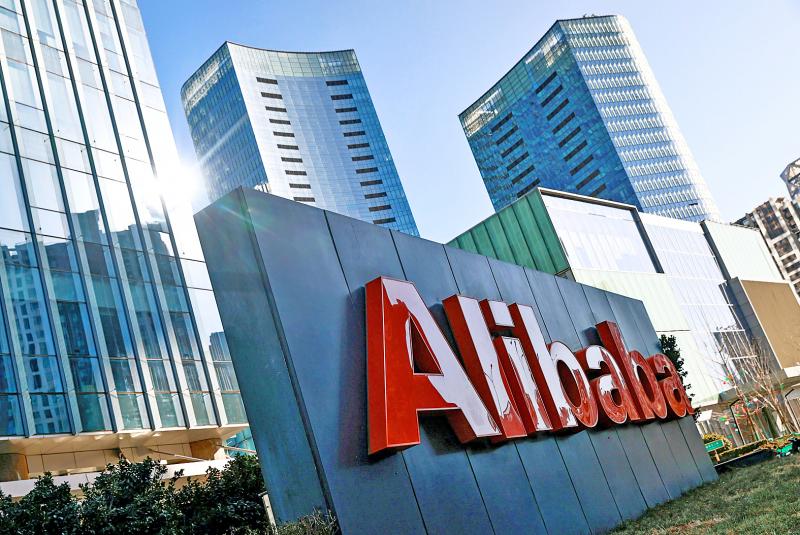E-commerce giant Alibaba Group (阿里巴巴) yesterday said it would spend 100 billion yuan (US$15.5 billion) to support Chinese President Xi Jinping’s (習近平) campaign to spread the nation’s prosperity more evenly, adding to pledges by tech companies that are under pressure to pay for the Chinese Communist Party’s political initiatives.
Alibaba said it would invest in 10 projects for job creation, “care for vulnerable groups” and technology innovation. Its 100 billion yuan pledge includes 20 billion yuan for a fund to “cut income inequality” in the company’s home province of Zhejiang.
Alibaba and other Chinese tech giants, including games and social media service Tencent Holdings Ltd (騰訊) have announced plans to invest in social welfare, technology development and other ruling party priorities in response to pressure to align with Beijing’s political and economic plans.

Photo: Reuters
Xi’s “common prosperity” campaign calls for spreading the benefits from China’s economic growth more widely and narrowing one of the world’s widest gaps between an elite with more billionaires than the US and the poor majority in the 1.4 billion population.
“We firmly believe that if society is doing well and the economy is doing well, then Alibaba will do well,” CEO Daniel Zhang (張勇) said in a statement.
Beijing has launched anti-monopoly, data security and other crackdowns on Internet industries since late last year in an effort to tighten control over companies the CCP worries might be too big and independent.
The party tolerated a widening gap between China’s rich and poor as the economy boomed over the past three decades.
Xi, who took power in 2012, has called for renewing the party’s “original mission,” which includes eradicating poverty, raising incomes, and directing investment toward strategic technology and other initiatives.
Tencent last month promised 50 billion yuan for “common prosperity” initiatives in healthcare, education and rural development. That doubled the company’s spending on corporate social responsibility.
Another e-commerce company, Pinduoduo Inc (拼多多), last month promised to spend US$1.5 billion on agriculture and other rural development projects.
Alibaba reported a profit of 45.1 billion yuan in the quarter ending in June.
Founder Jack Ma (馬雲), who stepped down as chairman in 2019, has long been one of China’s most prominent charitable donors. His foundation shipped medical supplies to Africa during the COVID-19 pandemic and has given to education, health and environmental causes.

Nvidia Corp chief executive officer Jensen Huang (黃仁勳) on Monday introduced the company’s latest supercomputer platform, featuring six new chips made by Taiwan Semiconductor Manufacturing Co (TSMC, 台積電), saying that it is now “in full production.” “If Vera Rubin is going to be in time for this year, it must be in production by now, and so, today I can tell you that Vera Rubin is in full production,” Huang said during his keynote speech at CES in Las Vegas. The rollout of six concurrent chips for Vera Rubin — the company’s next-generation artificial intelligence (AI) computing platform — marks a strategic

REVENUE PERFORMANCE: Cloud and network products, and electronic components saw strong increases, while smart consumer electronics and computing products fell Hon Hai Precision Industry Co (鴻海精密) yesterday posted 26.51 percent quarterly growth in revenue for last quarter to NT$2.6 trillion (US$82.44 billion), the strongest on record for the period and above expectations, but the company forecast a slight revenue dip this quarter due to seasonal factors. On an annual basis, revenue last quarter grew 22.07 percent, the company said. Analysts on average estimated about NT$2.4 trillion increase. Hon Hai, which assembles servers for Nvidia Corp and iPhones for Apple Inc, is expanding its capacity in the US, adding artificial intelligence (AI) server production in Wisconsin and Texas, where it operates established campuses. This

Garment maker Makalot Industrial Co (聚陽) yesterday reported lower-than-expected fourth-quarter revenue of NT$7.93 billion (US$251.44 million), down 9.48 percent from NT$8.76 billion a year earlier. On a quarterly basis, revenue fell 10.83 percent from NT$8.89 billion, company data showed. The figure was also lower than market expectations of NT$8.05 billion, according to data compiled by Yuanta Securities Investment and Consulting Co (元大投顧), which had projected NT$8.22 billion. Makalot’s revenue this quarter would likely increase by a mid-teens percentage as the industry is entering its high season, Yuanta said. Overall, Makalot’s revenue last year totaled NT$34.43 billion, down 3.08 percent from its record NT$35.52

PRECEDENTED TIMES: In news that surely does not shock, AI and tech exports drove a banner for exports last year as Taiwan’s economic growth experienced a flood tide Taiwan’s exports delivered a blockbuster finish to last year with last month’s shipments rising at the second-highest pace on record as demand for artificial intelligence (AI) hardware and advanced computing remained strong, the Ministry of Finance said yesterday. Exports surged 43.4 percent from a year earlier to US$62.48 billion last month, extending growth to 26 consecutive months. Imports climbed 14.9 percent to US$43.04 billion, the second-highest monthly level historically, resulting in a trade surplus of US$19.43 billion — more than double that of the year before. Department of Statistics Director-General Beatrice Tsai (蔡美娜) described the performance as “surprisingly outstanding,” forecasting export growth